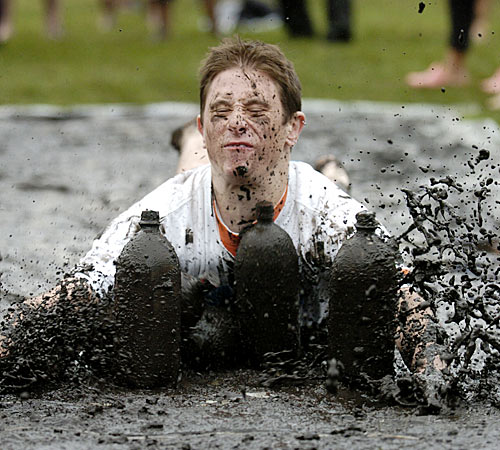Playful pranks are budget burden
October 7, 2008
Look out for lonesome dollar bills.
“You don’t know what the poo dollar is?” said Mike Fuja, junior in Aviation.
A crowd outside Fuja’s fraternity house chuckled, wrapped in attention.
“It’s where someone wipes their ass with a dollar bill, folds it and puts it on the corner,” Fuja said. “Then, when someone picks it up to put it in their wallet or whatever, they get poo on their hand.”
Pranks … gross, cute, funny. Stay in college long enough, and one is bound to have a prank experience. However, seemingly minor pranks can actually cause a world of damage.
Get The Daily Illini in your inbox!
According to Facilities and Services, mud sliding, turning up large amounts of wet soil, has cost the University about $6,500 since spring 2008.
Still, some at the University consider this activity much more than just a prank.
“I really don’t think mud sliding is a prank,” said Wayne Bugaj, subforeman of the Facilities and Services grounds department. “I consider it as a type of vandalism.”
Bugaj said that when mud sliding occurs, it compacts the soil, allowing it to hold more water, making the turf quality decline.
“If no action is taken, the turf will die,” he said.
Depending on the turf damage, it can require up to five grounds employees working three 8-hour days to repair it. With each employee covering 23 acres of campus, repairing heavily damaging mud slide regions leaves 115 acres unattended.
In many areas, such as the Quad, the grounds staff does not have the option of simply using sod to repair damaged turf, Bugaj said. Instead, they prefer to work with seed because of the high resulting quality it produces.
According to Bugaj, seed needs to be aerated, watered and roped off to keep it from being trampled by walkers, which defaces the landscape.
Grounds crews are also faced with time constraints, as prime seeding time only lasts from August to mid-September.
Ryan Bloom, freshman in Business, said he thought mud sliding was not that serious.
“It’s not really causing any damage,” Bloom said. “It’s just people having fun.”
Good fun can only go so far, Bugaj said. If enough mud sliding occurs, other services, such as campus trash pickup, general upkeep and caring for campus plant life could suffer.
“It’s a very unnecessary financial burden,” he said.
Although police have not made any arrests, Lt. Skip Frost of the University Police Department said mud sliding is still a criminal offense: property damage.
“People think it’s a big lark, a recreational activity,” Frost said. But the truth of the matter is you could be prosecuted, he said.
Serena Vere, senior in LAS, said she was unaware of the strict consequences.
“I didn’t realize that mud sliding constituted property damage,” Vere said. “Maybe the University should designate a mud sliding area near the quad.”
Campus fountains have also seen their fair share of other pranks bordering on vandalism.
Tony Kelley, water station foreman, said much of what his people deal with is not vandalism, but improper use.
“We have a half dozen fountains around campus, and all have received dye or ‘suds-ing’ agent at some time or another,” Kelley said.
Last year, there was even a 20-foot-long sailboat in one of the fountains.
Improper use or not, it still takes time and effort to clean each fountain, allowing it to fully operate.
Margaret Caston, a water station operator, said if a color dye cannot be identified, the fountain is shut down and agencies outside of the University have come in.
At least two laborers, two plumbers, one operating engineer and a water station operator are necessary to drain, clean and refill a fountain.
Tainted fountain water cannot simply be funneled down the storm drain.
For safety, it must be considered a waste product, forcing the sanitary district to handle the water.
All this can cost hundreds to thousands of dollars, Kelley said. “We want people to enjoy (fountains), but in a proper way.”
Still, with pranks, no entity can go unscathed. This is especially true when it comes to University housing.
Despite normal dorm room debauchery such as inter-floor rivalries, knock-knock ditch and the like, some residence hall antics can go too far, like when a fire alarm is purposely pulled for fun.
When any fire alarm is pulled, prank or not, a fire department comes with a normal response. According to Lt. Bob Mullins of the Urbana Fire Department, this consists of three engines, a ladder truck and a command car.
Firefighters can respond within three to five minutes to a residence hall alarm.
“We have to plan for the worst,” Mullins said.
Lt. Dave Wisher of the Urbana Fire Department recounted an instance at Scott Hall where one individual pulled fire alarms while being chased by firefighters.
“The kid was in front of us, pulling each one going in a circle,” Wisher said. “We were basically chasing him down.”
By Wisher’s account, about $260 are used on a single call, and that is simply to cover the salary of the fire personnel. Other expenses, such as fuel, increase this amount.
However, the worst penalty for pulling a fire alarm as a prank is leveled when one gets caught.
Dwayne Bishop, fire prevention officer for the Urbana Fire Department said that students can face serious legal charges for pulling fire alarms.
There are real consequences to prank-like actions, so next time there is a suspicious dollar on the ground, or it looks like a good day for mud sliding, officials advise students to think about the costs of their actions.
“Students need to recognize that they are opening themselves up to personal harm,” Bugaj said.







